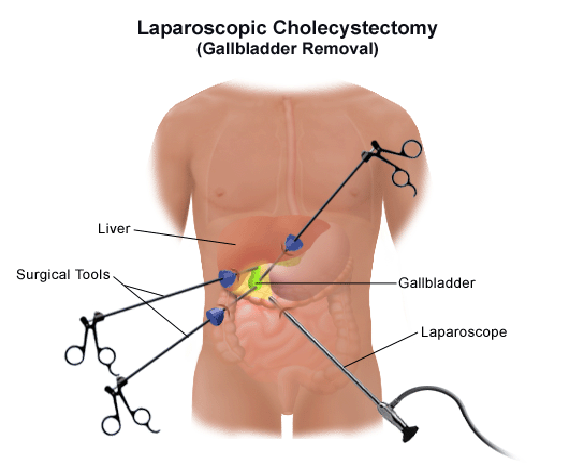
Your gallbladder is a small organ in your upper abdomen.
The gallbladder collects and stores a liquid called bile that helps your body break down food. Small, hard deposits called gallstones can form in the gallbladder. This is a common condition.
In the past, doctors made a large cut (incision) in the belly to remove the gallbladder. This is called open surgery. Today, doctors can do this surgery with tiny instruments and just a few small cuts. This is called laparoscopic surgery, because the main instrument is called a laparoscope. Minimally invasive surgery is a general term for surgery with these small instruments.
Gallstones are often the cause. These small, hard deposits form in the gallbladder. They can also get into the bile duct, which connects the gallbladder with your intestines.
You are more likely to get gallstones if you:
Symptoms can include:
Taking the gallbladder out is usually the best way to treat gallbladder problems. You might get some relief from changing your diet. For example, eating less fat can help. But gallstones rarely go away on their own.
You will have general anesthesia for your laparoscopic gallbladder removal. This means you are asleep during surgery. When surgery is finished, the surgeon closes your incisions with tiny stitches or staples.
Once you are asleep, an incision is made near your belly button and inserts a small device called a port. The port creates an opening that fills the abdomen with gas. This creates space to do the operation. Next, a small camera is inserted through the port. The camera shows the surgery on a screen in the operating room. Finally, your gallbladder is gently disconnected and taken out through one of the incisions. Most operations need 3 or 4 incisions, but some have more.
A few people cannot have laparoscopic gallbladder removal. You might have open surgery if you are one of these people. Some reasons for having or switching to open surgery are:
It is not a complication (problem) if we decide to switch to open surgery. It is switched if open surgery is the safest option for you. Usually, it is unknown until after the laparoscopy starts. We use our best judgment about the safest surgery for you.
You can probably go home the next day after you have your surgery. You need to be able to drink liquids before you go home.
You will feel some pain after surgery. Pain at the incision sites and in your abdomen is common. You might also have pain in your shoulders. This is from the air put into your abdomen during the operation. You should feel better in a day or two. Tell your doctor or nurse if you keep vomiting or feeling nauseated.
You should be as active as your body allows. Doctors recommend walking. You can go up and down stairs on the day of your surgery. You can expect to feel a little better each day after going home.
You can probably go back to normal activity about a week after laparoscopic gallbladder removal.
If you had an open surgery with a large incision, you need more time to recover.
You will probably need to stay in the hospital for a few days after surgery. Expect to go back to full activities in 4 to 6 weeks. You will probably recover more slowly in other ways, too. Your doctor can tell you what to expect.
